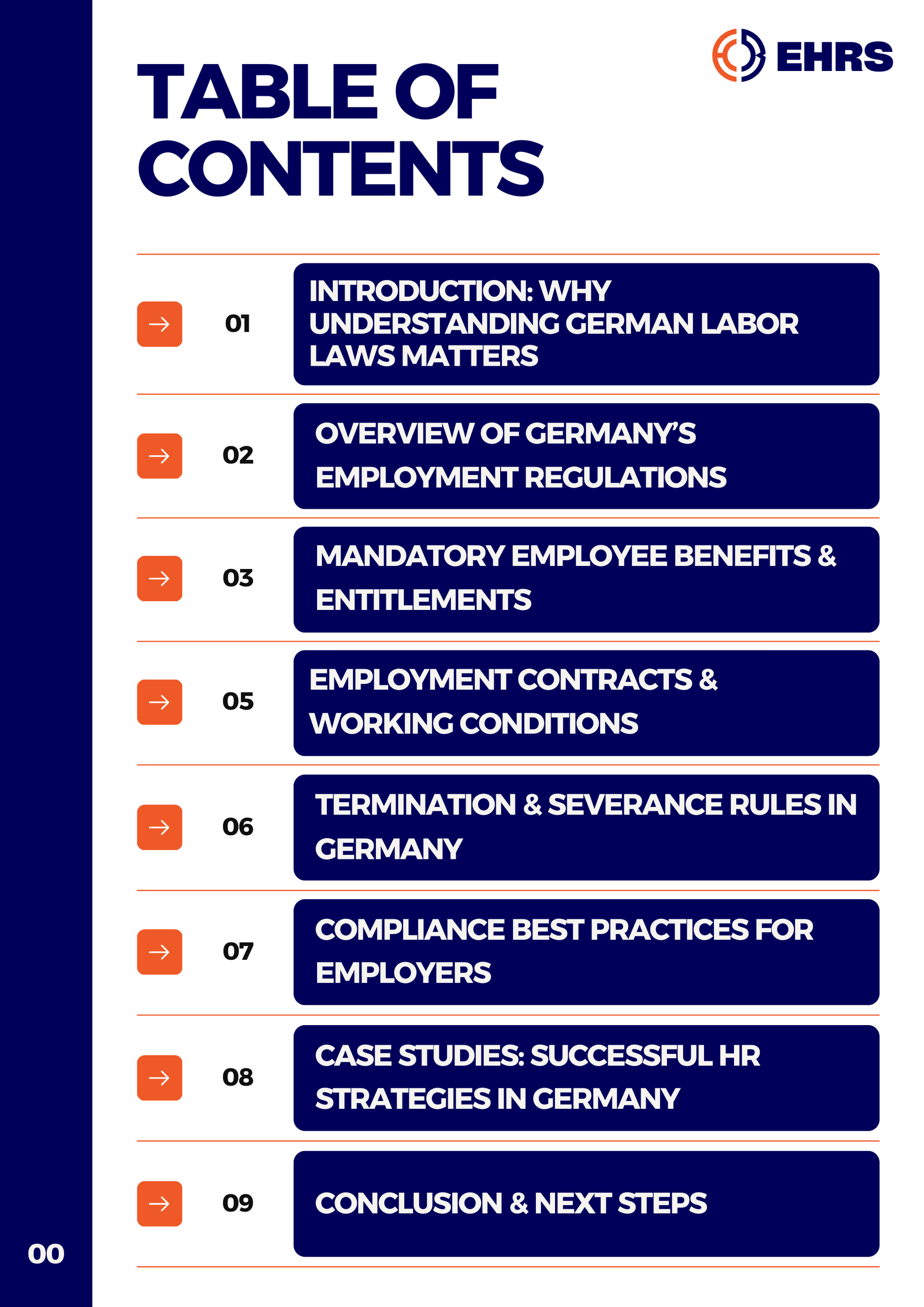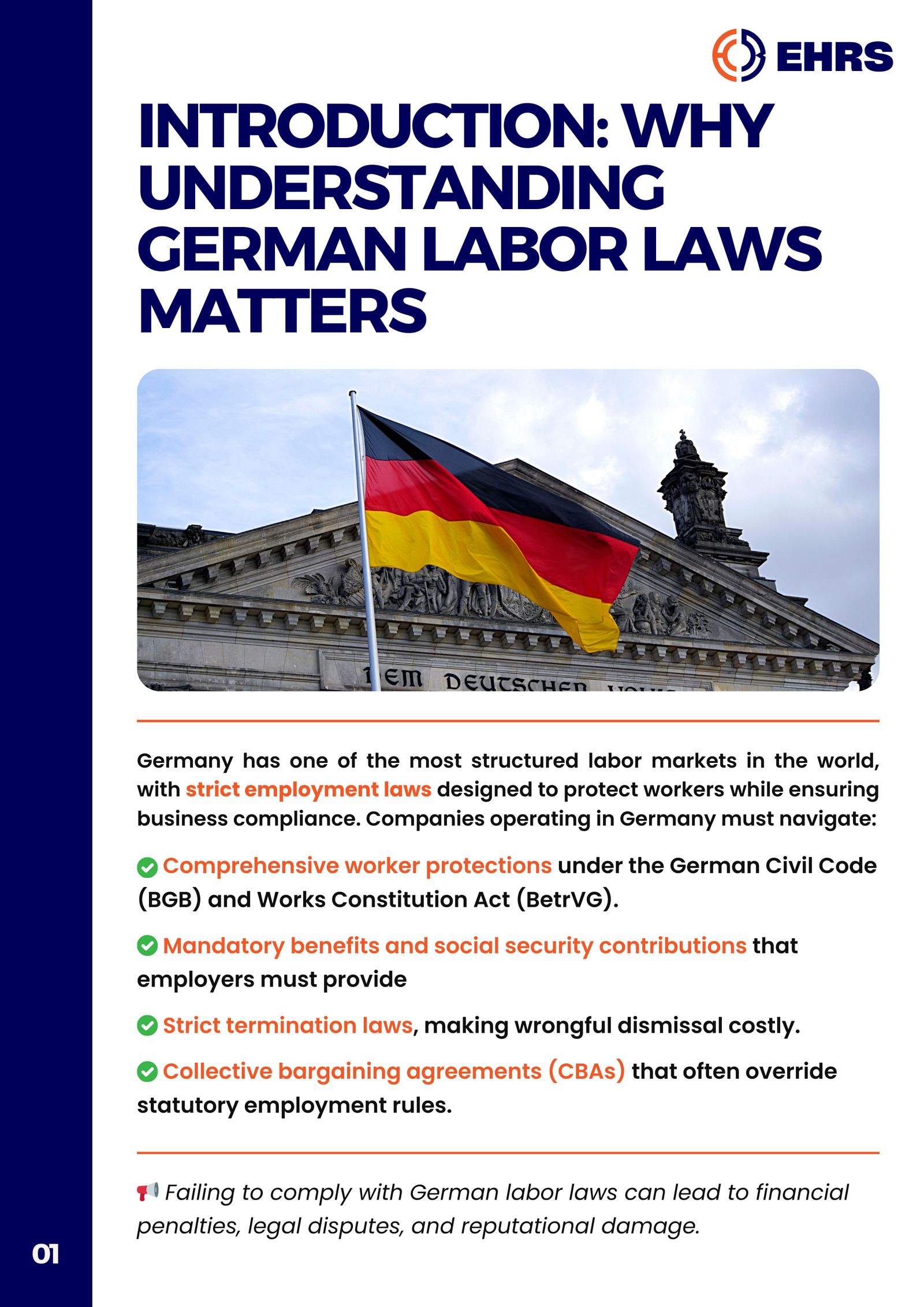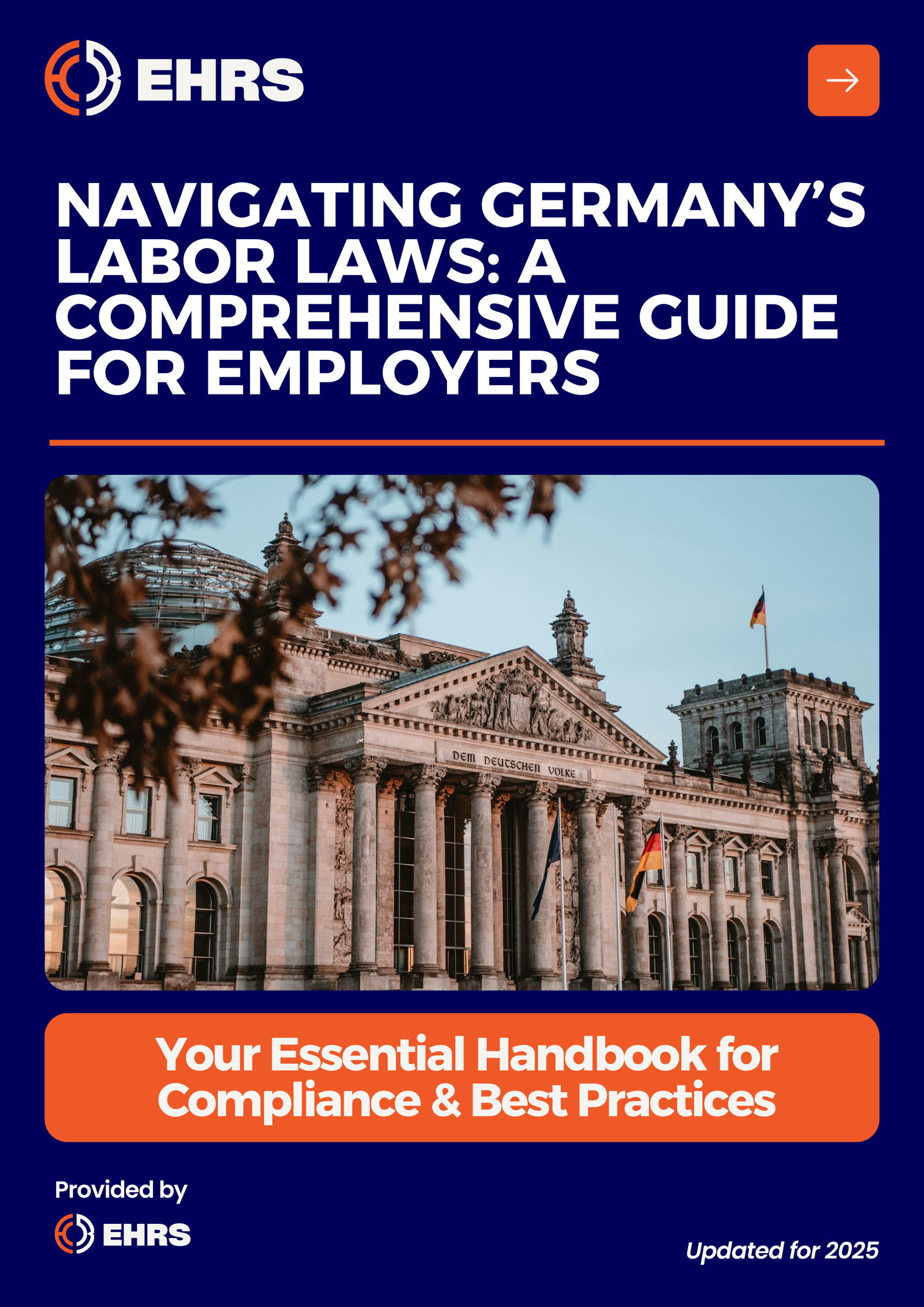GERMANY
List of countries
HR Services for Germany
Our company provides customized HR services in Germany to help international businesses expand smoothly and stay compliant with local regulations.
Germany has much to offer US and UK companies looking to expand into Europe. Your HR solutions or decision to outsource your HR needs can capitalize on the benefits of expansion in Germany.
According to the Global Innovation Index, Germany is the 9th most innovative country in the global market, and positions companies to succeed. Germany even founded the Agency for Breakthrough Innovations.
ALL YOU NEED TO KNOW ABOUT
HR OUTSOURCING IN GERMANY
GERMAN EMPLOYMENT
REGULATIONS TO KNOW
THE BENEFITS OF
EXPANSION IN GERMANY
THE CHALLENGES OF
EXPANSION IN GERMANY

Check our free HR guide to help you quickly improve your HR in Germany
FAQ for Germany
Learn more about Germany
Free Download
Request your free guide and receive it immediately

All You Need to Know About Outsourcing
Your HR in Germany with EHRS
Efficient HR Management
Europe HR Solutions handles complex HR tasks in Germany, including payroll, recruitment, compliance, and employee relations, ensuring smooth operations for your business. Our comprehensive HR services package for Germany covers every aspect and allows you to focus on business growth while we manage the complexities of HR operations.
Compliance with German Labor Laws
Germany’s detailed labor regulations require precise adherence to employment contracts, benefits, and working conditions. We ensure your HR operations fully comply with local laws. Europe HR Solutions provides expert guidance to ensure your business meets all legal requirements.
Cost-Effective HR Solutions
Outsourcing your HR eliminates the need for an in-house team, reducing costs and freeing resources to focus on strategic business growth.
Germany Employment Regulations to Know
Employment Contracts
German law mandates written employment contracts that outline salary, working hours, benefits, and termination terms. Collective bargaining agreements (CBAs) often apply, depending on the industry.
Working Hours and Overtime
The standard workweek in Germany is 40 hours, with a legal cap of 48 hours. Overtime is allowed but must align with strict legal requirements and may require additional compensation.
Employee Benefits
Employers in Germany must provide mandatory benefits, including health insurance, retirement contributions, paid vacation (minimum of 20 days), and maternity/paternity leave in compliance with German laws.
The Benefits of Expansion in Germany
Robust Economy
Germany is the largest economy in Europe, offering a stable business environment and access to a highly developed market with significant purchasing power.
Skilled Workforce
Germany is home to a well-educated and highly skilled workforce, particularly in manufacturing, engineering, IT, and finance sectors, ensuring access to top talent.
Strategic Location
Located in the heart of Europe, Germany provides excellent access to European and global markets, supported by world-class infrastructure.
The Challenges of Expansion in Germany
Complex Labor Laws
Germany’s labor laws are highly regulated, with strict requirements around contracts, terminations, and employee rights. Navigating these laws demands expert HR support.
High Labor Costs
Mandatory social contributions and generous employee benefits result in relatively high labor costs, requiring careful financial planning for sustainable growth.
Bureaucracy
Setting up operations in Germany involves navigating significant administrative and regulatory processes, which can be time-consuming without local expertise.
Talk to an HR specialist about payroll, compliance, and audits today.
Expand into Germany with confidence.
Most Asked Questions
About Germany
Why do I need to bother with detailed employment contracts in Germany? Isn’t a handshake enough?
German labor law requires written contracts for fixed-term employees and strongly recommends them for all hires to clarify terms like working hours, salary, and benefits. Without a written contract, disputes can easily arise, leaving your business exposed.
Why It’s Risk-Free: We draft fully compliant contracts tailored to German regulations, protecting you from misunderstandings or legal disputes.
Do I really need a probation period? Can’t I just fire someone if they don’t work out?
Without a probation period (max. six months), employees gain full termination protection under Germany’s strict dismissal laws. Firing someone without proper grounds can lead to reinstatement orders or expensive settlements.
Why It’s Risk-Free: We ensure probation periods are clearly included in your contracts, giving you the flexibility to assess new hires.
Overtime rules sound expensive. Can’t I just make overtime part of the salary package?
Overtime must be compensated with pay or time off unless explicitly waived in the contract. Failing to address this can lead to legal claims for unpaid hours.
Why It’s Risk-Free: We ensure your contracts and policies address overtime properly, protecting you from disputes or unexpected costs.
Sick leave seems like a major burden for employers. What if employees abuse it?
Employers must pay 100% of salary for the first six weeks of sick leave. However, employees must provide a doctor’s certificate if the absence exceeds three days. Abuse can be addressed through legal channels.
Why It’s Risk-Free: We implement clear sick leave policies that prevent abuse while protecting you from legal disputes.
Terminating employees in Germany sounds impossible. What if I can’t afford to keep them?
Termination laws in Germany are strict. Employers must provide valid reasons, follow notice periods, and often pay severance. Failure to comply can result in reinstatement orders or fines.
Why It’s Risk-Free: We handle the termination process, from legal justification to severance calculations, ensuring compliance and minimizing risks.
Collective bargaining agreements (CBAs) seem restrictive. Can I avoid them?
CBAs are binding if your industry falls under one, setting rules for wages, benefits, and work conditions. Non-compliance can lead to legal challenges and fines.
Why It’s Risk-Free: We ensure full compliance with applicable CBAs while maximizing flexibility where possible.
Hiring non-EU employees seems like a bureaucratic nightmare. Is it even worth it?
Hiring non-EU employees requires work permits, and failure to comply can delay onboarding or lead to penalties. The Blue Card offers a fast-track option for skilled workers.
Why It’s Risk-Free: We handle the entire permit process, ensuring smooth transitions and enabling you to access global talent without delays.
How do I know compliance will be worth the investment? Isn’t this just adding more cost to my business?
The cost of non-compliance—fines, lawsuits, or employee turnover—far exceeds the cost of proactive compliance. Investing in compliance builds trust and long-term stability.
Why It’s Risk-Free: We ensure your operations are legally secure, cost-effective, and aligned with German regulations, saving you time and resources in the long run.
Fixed-term and indefinite-term contracts seem complicated. Can’t I just hire everyone on fixed-term contracts?
Fixed-term contracts in Germany are highly regulated. Misusing them—like extending beyond the legal limit of two years or four renewals—can lead to automatic conversion into indefinite-term contracts.
Why It’s Risk-Free: We ensure your contracts comply with these rules, giving you control over your workforce while avoiding unintended obligations.
Why should I stick to the 40-hour workweek? Can’t I just pay people extra for working more?
Germany’s Working Time Act limits hours to 8 per day and 48 per week. Violations can lead to fines or employee burnout claims, even if overtime is paid.
Why It’s Risk-Free: We structure work schedules to comply with these rules while incorporating flexibility and maintaining productivity.
Do I really have to give 20+ vacation days? Isn’t that excessive?
German law mandates a minimum of 20 days of vacation for a 5-day workweek, but many contracts or CBAs offer more. Skipping this can lead to fines or demoralized employees.
Why It’s Risk-Free: We ensure compliance with leave entitlements while helping you maintain a competitive benefits package that supports employee satisfaction.
Parental leave sounds disruptive. What if I lose key employees for months?
Employees are entitled to up to three years of parental leave, but employers are not obligated to pay salaries during this time. You can plan temporary replacements while retaining your talent long-term.
Why It’s Risk-Free: We help you navigate parental leave planning, ensuring compliance and continuity in operations.
Works councils sound like a headache. Do I really need one?
Companies with 5+ employees may be required to set up a works council if requested by employees. Works councils have significant consultation rights and can block decisions if not properly engaged.
Why It’s Risk-Free: We guide you in establishing and collaborating with works councils, ensuring smooth operations and avoiding disputes.
What’s the point of offering mandatory benefits like pensions or health insurance? Aren’t salaries enough?
In Germany, employers must contribute to health insurance, pensions, unemployment, and accident insurance. These contributions are mandatory and skipping them can lead to audits and fines.
Why It’s Risk-Free: We manage all mandatory benefits, ensuring compliance while helping you structure competitive offerings that attract top talent.
What if I fail a compliance audit or labor inspection? Could it shut down my business?
German labor authorities closely inspect payroll, contracts, and workplace safety. Non-compliance can lead to fines, back payments, or operational restrictions.
Why It’s Risk-Free: We conduct regular compliance audits, preparing your documentation and practices to pass inspections without disruptions.



